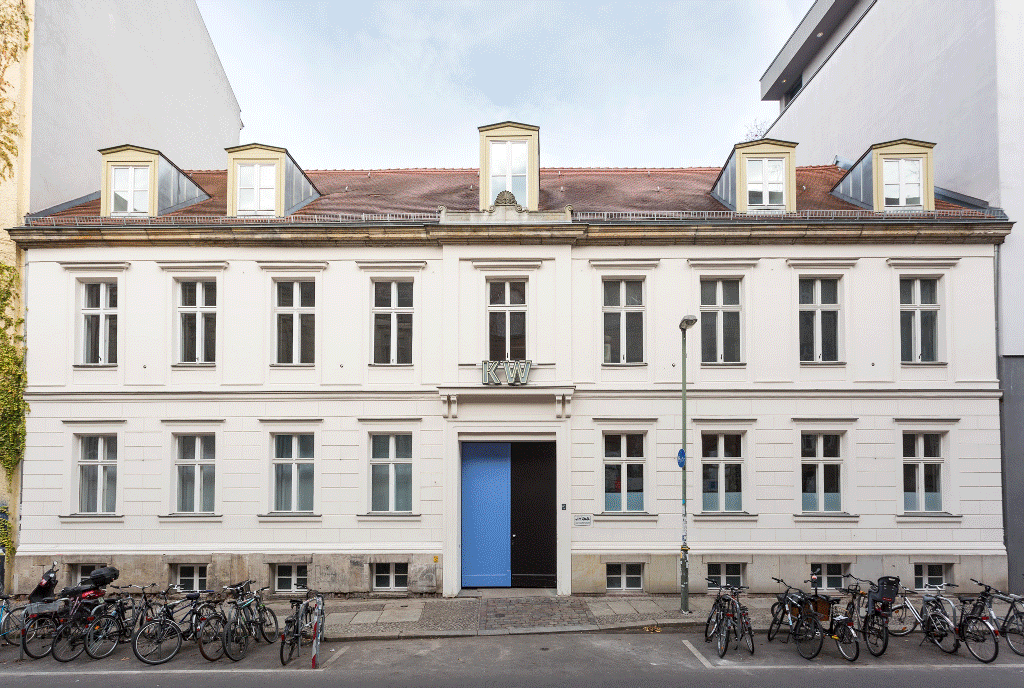The 10th Berlin Biennale for Contemporary Art titled We don’t need another hero takes place from June 9 to September 9, 2018 at four permanent exhibition venues: Akademie der Künste at Hanseatenweg, KW Institute for Contemporary Art, Volksbühne Pavilion, and ZK/U – Center for Art and Urbanistics. In co-production with HAU Hebbel am Ufer, HAU2 serves as a site for two performances over the course of the 10th Berlin Biennale.
Events for the public program I’m Not Who You Think I’m Not are being held at these venues and at various other locations throughout the city. The exhibition venues were chosen not only because of their historic relevance in Berlin but also because of what they represent today. The 10th Berlin Biennale situates itself in conversation with these interrelated timeframes. The invited artists propose a renegotiation of the systems of exchange produced within these venues. The presented works also expand the possibilities of exchange by introducing their own perspectives.
AKADEMIE DER KÜNSTE
Founded in 1696 as an academic institution, the Akademie der Künste is one of the oldest cultural institutions in Europe. The Akademie has been formed through a membership process, which endures to this day. In its early history the Akademie der Künste foregrounded learning through teaching and exchange among members. Having established itself as a center for national cultural renewal and enlightenment, it gradually assumed its present-day form as a platform for discussions on art and politics. The 10th Berlin Biennale is interested in positioning sociopolitical and historical narratives in conversation with stories that inhabit the expansive archives of the Akademie, the lineage of membership, and the Brutalist architecture of Werner Düttmann from the late 1950s.
The 10th Berlin Biennale exhibition at the Akademie der Künste starts with a temporary structure that introduces historical and visual elements from two heritage sites and one historical figure: Sanssouci, a summer palace built by Frederick the Great, King of Prussia in Potsdam, DE, between 1745 and 1747; Sans-Souci Palace in Milot in Haiti, built by King Henri of Haiti between 1810 and 1813; and Haitian revolutionary leader, Colonel Jean-Baptiste Sans Souci, an enslaved African who led troops in guerrilla fighting against the French in 1791. This conceptual frame underlines the ideological underpinnings of all historical narratives and the institutions that house them.
HAU HEBBEL AM UFER
HAU Hebbel am Ufer in Berlin-Kreuzberg unites the three spaces HAU1, HAU2, and HAU3 in an international production house for performing arts. At HAU2 the 10th Berlin Biennale presents two evenings dedicated to an artistic research project that investigates the history of Kwaito, a musical genre that originated in Soweto in post-1994 South Africa. The events take place on June 15 and 16, 2018, two specific dates marking the forty-second anniversary of the 1976 Soweto student uprising, an event that serves as an important reference point for the #RhodesMustFall and #FeesMustFall student protest movements that have been ongoing in South Africa since 2016.
KW INSTITUTE FOR CONTEMPORARY ART
Founded in the early 1990s, shortly after the fall of the Berlin Wall, KW Institute for Contemporary Art is a space for the production, display, and dissemination of contemporary art. Founded as an association of young people passionate about art, KW and the Berlin Biennale for Contemporary Art that soon followed were established with the desire to engage with international contemporary art discourses. Throughout the past twenty-six years, KW has been able to construct its own legacy around the people who have shaped its development and those who continue to imagine its future. We don’t need another hero marks an intersection from which we can imagine what the next twenty years of a global-minded contemporary art biennial might look like. The exhibition at this venue begins by introducing viewers to a portrait of a selection of people who have helped define the institution and continues with works that renegotiate inherent hierarchical structures in political spaces, knowledge generating institutions, and personal spaces.
VOLKSBÜHNE PAVILION
The Volksbühne Pavilion is a glass construction located on Rosa-Luxemburg-Platz next to the Volksbühne theater’s main building and situated a short walk away from KW. Previously the pavilion hosted artists’ projects as well as the theater’s bookshop and box office. For the 10th Berlin Biennale the pavilion features an artistic project that considers its historical location of the pavilion and includes a malleable installation open to public participation. Here performances and other durational actions take place over the course of the biennial.
ZK/U – CENTER FOR ART AND URBANISTICS
ZK/U – Center for Art and Urbanistics is located on the grounds of a former railroad depot in Berlin’s neighborhood of Moabit. It was initiated and is run by the artist collective KUNSTrePUBLIK. The collective cooperated with the 5th Berlin Biennale in 2008, in which their temporarily installed project Skulpturenpark Berlin_Zentrum also served as a venue. At the time the “park” was an empty plot of land, a former part of the Berlin Wall in the heart of the city—and the object of intense real-estate speculation. The 10th Berlin Biennale reestablishes a dialogue with the collective by inviting selected artists for extended stays in Berlin to work in the studio spaces that form part of ZK/U’s residency program. In their practices these artists investigate how their politicized bodies respond to the inherent systems of power that define the built city environment. Other projects critically examine varied imagined schemas for natural and constructed environments, both present-day and historic.



